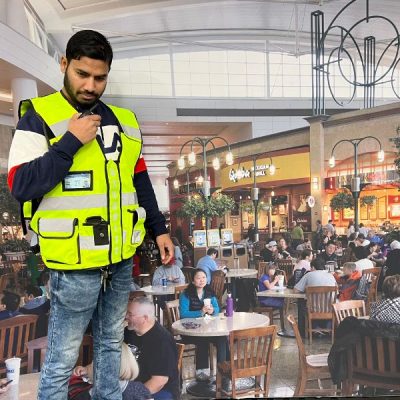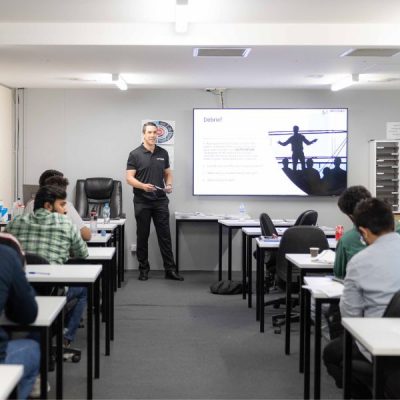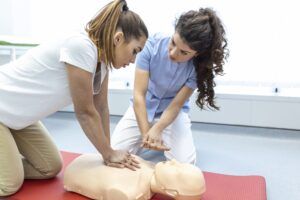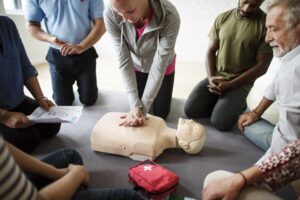A security licence is a requirement to work as a bouncer.
In New South Wales (NSW), completing a CPP20218 Certificate II in Security Operations is a requirement to work as a bouncer. This certification provides the necessary training and knowledge to perform the duties of a security guard, including those specific to the role of a bouncer.
The CPP20218 Certificate II in Security Operations covers various areas relevant to the security industry, such as access control, crowd control, conflict resolution, legal and ethical responsibilities, communication skills, and emergency response. By completing this certification, individuals acquire the essential skills and competencies needed to effectively carry out their duties as a bouncer while adhering to the regulations and standards set by NSW authorities.
It’s important to note that certification requirements may vary in different regions, so it’s essential to verify the specific licensing and certification requirements established by the regulatory bodies in your jurisdiction.
Once you complete the CPP20218 Certificate II in Security Operations you can then apply to SLED for a Class 1AC Security Licence, a further cost of $200 per year will be required or $640 for a 5 year security licence.
To determine whether you need a security license to become a bouncer, you should research the regulations and licensing requirements specific to your location. Contact the relevant local authorities or licensing agencies responsible for overseeing security licensing to obtain accurate and up-to-date information regarding the requirements in your area. They can provide you with detailed information on the necessary qualifications, training programs, and application procedures to obtain a security license for working as a bouncer.
The term Bouncer has long been discarded for the newer more modern term Crowd Controller. Even that term is now being replaced with the term Security Officer, which is more meaningful in the terms of the training and responsibilities that a modern Security Officer has.
The duties of a bouncer typically include:
Access Control: Checking identification, tickets, or credentials to ensure only authorized individuals are allowed entry to the establishment or event.
Crowd Management: Maintaining order and controlling the flow of patrons inside the venue to prevent overcrowding and ensure a safe environment.
Conflict Resolution: Diffusing conflicts or potential altercations among patrons using verbal de-escalation techniques, mediation, and assertive yet non-violent methods.
Physical Security: Monitoring the premises for suspicious or disruptive behavior, potential threats, or unauthorized activities. This may involve patrolling designated areas, conducting searches if necessary, and enforcing venue policies.
Ejection and Removal: Removing individuals who pose a threat to the safety or well-being of others or who violate the establishment’s rules and regulations. This may involve escorting them off the premises and coordinating with law enforcement if needed.
Emergency Response: Responding quickly and effectively to emergency situations, such as medical incidents, fights, or evacuations, by following established protocols and providing assistance as necessary.
Customer Service: Assisting patrons with inquiries, providing directions or information, and ensuring a positive and welcoming atmosphere for all guests.
Liaison with Law Enforcement: Cooperating and communicating with local law enforcement if incidents occur that require their intervention or if legal issues arise.
Reporting and Documentation: Documenting incidents, disturbances, or any noteworthy occurrences in detailed reports, including descriptions of individuals involved, actions taken, and any necessary follow-up actions.
Prevention and Deterrence: Actively observing and deterring potential security threats, such as underage drinking, drug use, or theft, through proactive surveillance and enforcement of venue policies.
It’s important to note that the specific duties of a bouncer may vary depending on the establishment, event type, and local regulations. Bouncers are responsible for maintaining a safe and secure environment while ensuring the enjoyment and well-being of patrons within the guidelines set by the establishment.
Training Course for NSW Security Licence
If you are interested in pursuing a career as a Security officer our Auburn training centre runs a 10 Security Guard Course.
Located in Auburn Sydney, at 15 / 191 Parramatta Road, AUBURN NSW 2144 with free onsite parking for our students.
Multisec Training delivers affordable Security Guard training, located in Auburn Sydney.







